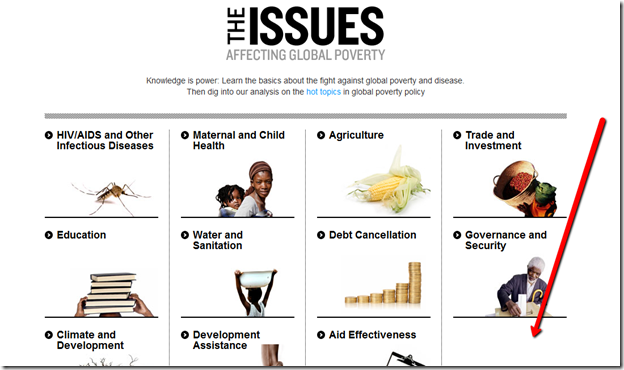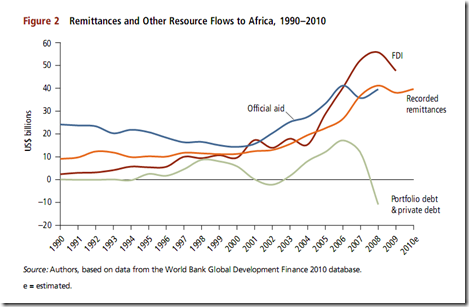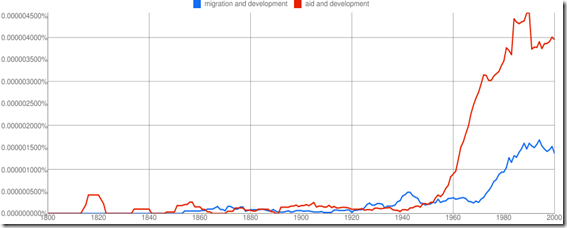Mobility Inference from Call Data from Joshua Blumenstock on Vimeo.
28 November 2024
Measuring internal migration with mobiles
Mobility Inference from Call Data from Joshua Blumenstock on Vimeo.
06 November 2024
Killer facts on migration
- Economic gains to even modestly greater global migration flows are much larger than the total elimination of all policy barriers to trade and all barriers to capital flows (source).
- 82% of the Haitian-born who have left poverty have done so by leaving Haiti (at a PPP$10/day poverty line, i.e. 1/4 of median income for the bottom decile of UK incomes) (source).
- A Ghana-born, Ghana-educated semi-skilled construction worker earns at least six times the real living standard for doing exactly the same job in the US versus Ghana (source).
- A McDonalds worker can make up to 10 times as much in real terms doing exactly the same job in one country versus another country (source).
WDR 2013: Jobs (but no migration please)
"If a politician tells you that they are going to create a job, throw them out of the window. Fix the roads, fix the power, fix the security, and the people will create their own jobs."Or in the report's words "Labor policies matter less than assumed" (as an aside, Kathleen referred a few times to this page (38) as their "tweets" which jarred for some reason - but its a good summary of the arguments).
Stefan Dercon had a great line on the WDR as a valiant attempt to construct a coherent narrative from an incoherent literature. He also pointed out the lack of any political economy analysis. Which leads to the obvious criticism about migration.
I thought I'd wait until I'd actually read the thing before commenting, but yeah, its pretty weak. Here is the WDR explaining "Global patterns of migration":
The decline of transportation costs, the growth of Persian Gulf economies following surges in oil prices, and the entry into world markets of developing countries with large populations have all stimulated a surge of migrant workers worldwide.
Differences in expected earnings between the country of origin and the country of destination are an important reason for people to migrate. Earnings gains, however, are offset to varying degrees by the direct costs of migration (such as transportation fees and intermediation services) as well as by indirect costs associated with the difficulties of adapting to a different culture and society and leaving family and friends behind. These costs also help explain aggregate migration flows.As well as those "costs" there's also the whole global apartheid thing, in which a person's right to choose where to live and work is determined by the country of their birth and not by their talents or aspirations. There are 700 million people who would like to permanently move to another country - including over 38% of the population in every sub-Saharan African country surveyed (the WDR does cite the Gallup World Poll, just not this particular finding).
Gabriel Demombynes notes that the 2009 WDR (Economic geography) was much stronger on migration. As from a quick glance was the 1995 WDR (Workers in an integrating world). Perhaps the problem is just fatigue?
23 October 2024
The impact of remittances on poverty in Nigeria
"the receipt of internal remittances reduces the poverty headcount of households by 11.14% and poverty gap by 9.7% while the receipt of international remittances reduces poverty headcount, poverty gap and squared poverty gap by almost 100%"From a new working paper by Nnaemeka Chukwuone, Ebele Amaechina, Benjamin Okpukpara, Evelyn Iyoko and Sunday E. Enebeli-Uzor (via the Partnership for Economic Policy).
29 May 2025
Where is the Bono for migration?
the overwhelming explanation for who is rich and who is poor on a global scale isn’t about who you are; it’s about where you are
immigration restrictions are probably the greatest preventable cause of global suffering known to man.Why are there no celebrity advocates for immigration?
The rest of the article, Charles Kenny in Business Week, is excellent, including the research finding that McDonald's staff in the US earn 2.4 Big Macs per hour, compared to just one third of a Big Mac in India (for identical work producing an identical product).
27 December 2024
Impact of Labour Migration on “Children Left Behind” in Tajikistan
The most emblematic quote on the necessity of migration, viewed as a constrained choice, was given by a group of young boys from non-migrant families, who considered themselves lucky (and rich) enough never to have to migrate themselves:
“Those people who go to Russia do not go on a whim, but out of despair, from a bad life. They are willing, for the future of their children, to endure many hardships. They have no other choice.”From a report just published by UNICEF (and prepared by OPM). Like sweatshop labour, many on the left seem to see migration driven by desperation as a problem. When clearly it is that desperation due to poverty that is the problem, and uncomfortable symptoms such as poor quality jobs and migration are actually generally alleviating the problem (not that more shouldn't be done to address poverty directly).
22 December 2024
Life lessons from playing poker
Edit: Andrew reminds me about opportunity costs. If I only have £6 left then it would be silly to call a £5 raise on such long odds. The opportunity cost is playing the next round, where I might have better odds of winning a smaller amount. But if I have £500, then I can afford to take a smart £5 gamble with low odds of winning. So its a question of the overall budget constraints too. I'm not convinced that there are huge opportunity costs associated with the needed investment in a Honduran Charter City, relative to overall government expenditure (the idea is to encourage private investment for most of the construction).
25 October 2024
Why so little internal migration in India?
So - development as a process of transforming small, inefficient, but personal networks of connections to much broader nation-wide government- and market-coordinated networks - less personal (I haven't necessarily met the people helping me out when I'm in need, or those I might be helping out) - but more efficient due to the larger scale and the greater allowance for mobility. Development as the atomisation and individualisation of society. Something to be happy about? Similar to how folks moan about Facebook destroying strong ties and replacing them with abundant weak ties, as they continue to dive headfirst into the internet.
04 October 2024
Does media pessimism on migration and urbanisation get any worse than this?
China's rural poor left stranded as urbanites race ahead
As workers leave the countryside in the hope of better pay, the communities they leave behind face increasing poverty
...
Wang Fang and her husband, Chen Shuangfu, arrived in the provincial capital, Guiyang, 10 years ago, with just 10 yuan in their pockets. Their hard, unappealing work - collecting and sorting rubbish for recycling - earns them as much as 20,000 yuan a year, compared with their 1,000 yuan income back home. But their rural hukou means they are not entitled to many services - and, since the hukou is inherited, neither are their sons. (The Guardian)So, a couple living in rural poverty increase their income by a factor of TWENTY, from about £100 a year (at market exchange rates) to £2,000 a year, JUST BY MOVING TO THE PROVINCIAL CAPITAL, and you still want to find GRIPES!? Are you INSANE? Totally innumerate?!! Or know of some other secret government policy that nobody else has heard of that can increase the incomes of those living in rural poverty by MORE than 2000%?!! Get a grip!
Not for a second to deny that there are challenges to be overcome in the process of urbanisation. But writing long miserable articles about the woes of rural poverty without for a second stopping to celebrate the absolute wondrous miracle that is overnight 2000% pay increases for the poor, is insane. I would sort rubbish for recycling in a hovel for a 2000% pay raise. Wouldn't you?
That is the real story here. Not the fact that some poor rural people are still poor and rural.
28 September 2024
Brain Drain and Remittances - Yer Missing the Point!
Suppose that I was a labor economist studying the entry of women into the labor force, and most of the papers I wrote were trying to document is this a good thing.
Well, first of all, are they giving enough money to their husbands? What are their husbands really doing with it? Are they buying alcohol or not?
And second, what about the loss to their kids, and the terrible effects that fewer of them are being teachers and nurses any more. What’s happening to the kids in the schoolroom?
All concerns that are not crazy, that could be thought of as legitimate. But if there is very little research on the gains to women, the fact that women are now investment bankers and presidents, things that weren’t thinkable before they entered the labor force. If we really weren’t studying those things at all, or if they were thought to be uninteresting, what would that say about our underlying conception of the world?
The analogy to development is that I really think people in development are much too focused on developing countries rather than developing people.
18 September 2024
Reagan on Mexican Migrants
HT: Paul Curreri
13 September 2024
How can developing countries make the most of their diaspora?
- developing networks - there is a key role for embassies to play here, who could be doing a much better job at connecting with and engaging their diaspora (can they learn something from university alumni offices?)
- allowing dual citizenship (make coming and going as easy as possible, and people will come more often - currently "only 21 of Africa’s 54 countries allow dual citizenship")
- diaspora bonds (giving diaspora the opportunity to save their money by lending to the government and thus investing in their home country)
27 August 2025
Ouvrez Les Frontières
"I wrote 'Ouvrez Les Frontières' ("open the borders") to make clear that no matter what is going on in Africa, Africans should have the right to travel just like Europeans or Americans do. It's a question of human rights."Tiken Jah Fakoly, who played in Central Park last weekend.
21 August 2025
Important Sentences
For the elimination of trade policy barriers and capital barriers, the estimated gains amount to less than a few percent of world GDP. For labor mobility barriers, the estimated gains are often in the range of 50-150 percent of world GDP.Michael Clemens lays out a research agenda for how economists can constructively engage with an incredibly understudied subject.
21 June 2025
Bloody Foreigners
It's refugee week in the UK. Hurray for curry and cappucinos.
01 June 2025
Still with the Brain Drain thing?
31 March 2025
“Get your hand off my tail, you’ll make it dirty”
Hello there! Those of you who are new around here may have missed my incessant jabbering about migration and development. The World Bank has a new report which gives me a good excuse to jump back in the saddle.
This chart neatly shows the date at which recorded remittances from migrants exceed official aid as a resource flow to Africa - round about 2007.
Which is exactly the same year that we saw that great blossoming of attention to migration as a development issue, spearheaded by the fantastic MigrationWatch and MigrationThoughts blogs, celebrity advocates for immigration to the West, Western leaders sitting down with African leaders to discuss how they could increase levels of migration, and a spike in books written about migration and development.
Oh, nothing huh. Well what about the world’s premier development advocacy organisation (which I mean with actual sincerity), I bet they pay attention…. oh I guess not. But ONE, you even have an empty space there in the bottom corner for another issue!

I was about to make another snarky comment about academic research, but it turns out there are almost as many Google Scholar hits for “migration and development” (2.45 million) as “aid and development” (2.67 million). OK academia, my very scientific surveys says that you get a pass.
The rest of you have homework to turn in tomorrow, starting with Lant Pritchett, Michael Clemens, and YouNotSneaky!
07 February 2025
Brain Gain
The hypothesis goes something like this: first imagine you are born in a poor African country where the financial returns to education are low. Getting yourself qualified isn’t going to magic up any new jobs.
Now imagine there is a chance you might be able to escape to a rich country, where education does matter and has a big impact upon earnings.
The amount you choose to invest in your education depends on your chances of emigrating in the future.
So that’s at the individual level - but here’s the thing; at the national level the promise of emigration might actually increase the stock of educated people rather than reduce it if everyone decides to try and get more education than they would otherwise.
That’s the hypothesis.
Now for some evidence:
This paper explores a unique household survey purposely designed and conducted to answer this research question. We analyze the case of Cape Verde, a country with allegedly the highest ‘brain drain’ in Africa, despite a marked record of income and human capital growth in recent decades. Our micro data enables us to propose the first explicit test of ‘brain gain’ arguments according to which the prospects of own future migration can positively impact educational attainment. According to our results, a 10pp increase in the probability of own future migration improves the average probability of completing intermediate secondary schooling by 8pp. Our findings are robust to the choice of instruments and econometric model. Overall, we find that there may be substantial human capital gains from lowering migration barriers.Catia Batista, Aitor Lacuesta, and Pedro C. Vicente, Forthcoming in the Journal of Development Economics, ungated version here
In Praise of Slums: Part 2
Urban migration is a necessary and good thing.
It’s essential to rural development, to urban development, and poverty reduction in an era in which people are being helped to live longer, but have not yet begun to reproduce less.
However, it cannot in itself create rural development, urban development or poverty reduction. It has to be steered by policies which accept it as fact, and base rural, urban and economic development on that fact.
The fact that migration creates slums is not the fault of the migrants, and the solution does not lie in attempting to prevent their arrival: a Quixotic goal akin to stopping a river.
Rather: Accept these immigrants, and welcome them by planning for their arrival through tenure, services, public transport, planned neighbourhoods, and the creation of economic opportunities.
10 January 2025
Don’t hate the player, hate the game
Here are some great reflections from Tom, an ODI Fellow who just finished his term as a Kenyan civil servant.
I think one of the very many things I'm going to miss about Kenya is the people I work with, just not necessarily the system we were working in.
Which rings very true to me. I worked with some amazing people in Southern Sudan, but good systems take a really long time to create, and bad systems leave you hamstrung.
Which is partly why I am so enamoured by the idea of international migration (and charter cities) as shortcuts to bringing good institutions and poor people together.
We know the secret of development. It is good institutions. We have a reasonable idea what good institutions entail. The only problem is that we have very little idea about how good institutions are established in societies that currently have bad ones.
Yet we persist with the frustrating task of attempting to bring our good institutions to them, rather than contemplating the relatively simple task of bringing them to our institutions.
We already have incredible systems for delivering rule of law, healthcare, and education. We can give these systems to the global poor overnight, and they will stop being poor. Overnight. We could let them move here.





